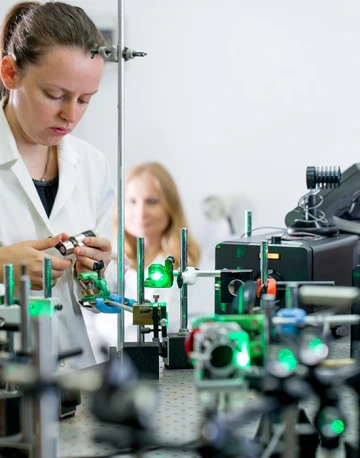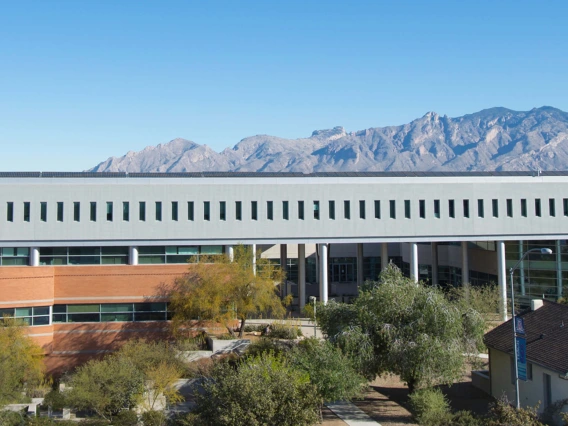Quantum Information Science & Engineering
Master of Science
Quick Facts

Top 1%
of all Higher-Ed
Institutions
- Center for World University Rankings, 2024
#1
In Best Value Among
Arizona's Public Universities
- Payscale, 2024
The University of Arizona is a recognized leader in Quantum Information Science, where we are developing the future quantum workforce, a priority for the United States. Now you can enter this high-demand field through the Quantum Information Science and Engineering (QISE) graduate program, an emphasis area of the general MS in Optical Sciences program in the Wyant College of Optical Sciences. The Optical Sciences MS - Quantum Information Science and Engineering (QISE) emphasis is a national model in QISE education, designed to train a transdisciplinary workforce -- spanning Optics, Engineering, Computer Science, Physics, and Math -- while exposing students to the social, ethical, and legal implications of QI technology.
Unique to the program is a balance across theoretical and online lab experiences with a curriculum that combines tailored courses (required and electives) in quantum mechanics, information theory, computer science, optics and materials, algorithms, and communications system engineering with experiential courses in law and social sciences, and laboratory courses. Students enrolled in the program will be affiliated with the NSF-ERC Center for Quantum Networks, where the University of Arizona is leading this effort to build the quantum internet, along with ten partner institutions worldwide.
With over 80 courses taught by faculty who are leaders in the field (see our full course list) and faculty research spanning everything from medical technologies to communications to space exploration, our Master of Science in Optical Sciences programs, including the QISE emphasis, offer students the flexibility to take the program full-time or part-time from anywhere around the globe.
The College of Optical Sciences program offers info sessions. The info sessions are held by OSC graduate students and will cover what it’s like to be a graduate student in the OSC program. Full details on info sessions can be found here
Must have completed Calculus I, II, and III, including Vector Calculus, Differential Equations, and Linear Algebra.
*Residents of some U.S. Territories may not be eligible. Please see our Eligibility & State Authorization page for more information.
This emphasis requires a set of required courses, elective courses, and laboratory courses. At least two electives must be lab courses. The courses for this program include:
Foundations of quantum optics, interaction of two-level atoms with light; basic elements of laser theory; fundamental consequences of the quantization of the light field; introduction to modern topics in quantum optics.
This course will introduce the field of quantum nanophotonics: how to implement quantum technology and quantum information processing based on integrated photonic circuits.
This is a one-semester course designed to provide students with a solid understanding of quantum mechanics formalism, techniques, and important example problems.
This course broadly covers the details of quantum photonic integrated circuits, including their theoretical underpinnings, design in state-of-the-art experimental platforms, general principles of fabrication, and how they are actually used in experiments. There is a heavy emphasis on finite element method simulation of devices. This is a laboratory course.
The course will be aimed at developing a principled understanding of classical and non-classical light and the generation, manipulation, and detection of non-classical light.
Error correction has an essential role in ensuring the integrity of data and is at the heart of every communication, computing, and data storage system. This graduate course first introduces fundamental coding theory concepts and then focuses on modern coding theory.
This course will focus on current research, laws, cases, issues, and policies in the field of law. This is a research seminar on how the Internet works and how it is regulated under U.S. law. It is designed to provide a rich foundation for thinking about Internet policy today and in the future, grounded in a realistic understanding of relevant technical issues. NOTICE: This course is open to both law and non-law students.
Outcomes
Skills
Earning your Master of Science in Quantum Information Science & Engineering will build core skills, including:
- Quantum equipment theoretical experience
- Quantum equipment hands-on experience
- Quantum mechanics
- Information theory
- Computer science
- Optics and materials
- Algorithms
- Communications system engineering
Potential Career Paths
Graduates of the Optomechanical Engineering MS will be prepared to pursue careers in the following fields:











